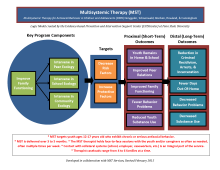
Multisystemic Therapy (MST) is an intensive family and community-based treatment that addresses the multiple determinants of serious antisocial behavior in chronic, violent, or substance abusing male or female juvenile offenders, ages 12 to 17, at high risk of out-of-home placement. The multisystemic approach views individuals as nested within a network of interconnected systems that encompass individual, family, and extra-familial (peer, school, neighborhood) factors. Intervention may be necessary in any one or a combination of these systems. The primary goals of MST programs are to decrease rates of antisocial behavior and other clinical problems, improve functioning (e.g., family relations, school performance), and promote behavior change in the youth’s natural environment. These outcomes are achieved at a cost savings by reducing the use of out-of-home placements such as incarceration, residential treatment, and hospitalization.
The ultimate goal of MST is to empower families to build a healthier environment through the mobilization of existing child, family, and community strengths and resources. The typical duration of home-based MST services is approximately 4 months, with multiple therapist-family contacts occurring weekly. MST addresses risk factors in an individualized, comprehensive, and integrated fashion, allowing families to enhance protective factors. Specific treatment techniques used to facilitate these gains are based on empirically supported therapies, including behavioral, cognitive behavioral, and pragmatic family therapies. Proven outcomes of MST include:
- reduced long-term rates of criminal offending in serious juvenile offenders,
- reduced rates of out-of-home placements for serious juvenile offenders,
- extensive improvements in family functioning,
- decreased behavior and mental health problems for serious juvenile offenders,
- favorable outcomes at cost savings in comparison with usual mental health and juvenile justice services,
- decreased recidivism and arrests.